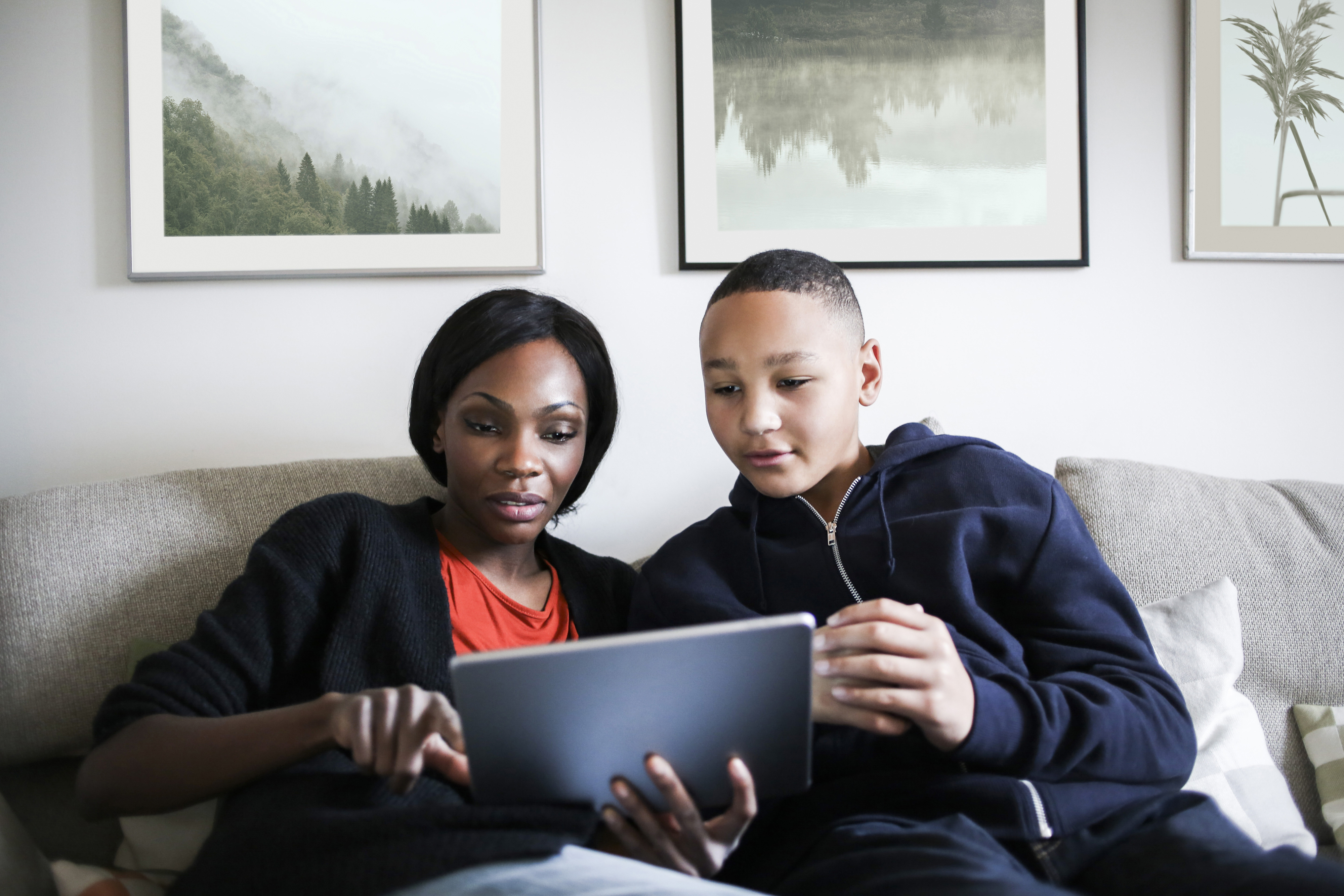Enter the "manosphere." The manosphere consists of a network of influencers (sometimes called "manfluencers") who target boys and young men online, often espousing misogynistic, anti-LGBT, and racist views. You've probably heard of one the most influential manosphere figures, Andrew Tate, who has been indicted on charges of sexual assault and human trafficking.

I'm curious about how parents of boys can have conversations with their sons about this divisive content, so I asked members of the BuzzFeed Community to share their experiences. I heard from a couple of parents and older siblings, and a number of Andrew Tate fans who called my question "garbage" (among other things I won't repeat). Then, Kaitlynn Mendes reached out.
Mendes is an Associate Professor of Sociology at Western University in Canada and the Canada Research Chair in Inequality and Gender. She's currently part of a team of researchers who are talking with teen boys about their experiences online, and she sat down for a call with me to tell me what she's learned from her studies and what parents need to know.
Mendes says that a lot of manosphere content centers on common anxieties among adolescent boys. It draws them in by presenting "easy" answers to complex problems like how to attract a mate. Mendes explains, "If you're a teenage boy, this is a really big time of change. You're feeling quite insecure about yourself, and you want to know how you can be sexually successful, romantically successful."

Unfortunately, these initial, helpful messages lead to more harmful ideas. In particular, these creators endorse strict, traditional gender norms that can make young people feel like there's only one "right way" to be a man. Mendes explained, saying, "They seem to offer simple solutions for how to make a girl want you: Men are just this way, and women are just this way. If you really want to be successful, you have to act like the 'alpha man.' And if you want a 'high-value woman,' these are things that you have to do."
According to Mendes, the message can boil down to, "Forget about women as individuals. Treat all women as though they're they're the same. It also really paints them in quite a bad light. You know, like women are shallow, women are genetically disposed to seek out 'high-value men,' and they want the 'alpha men.'"
Manosphere creators often legitimize their beliefs about gender by couching them in scientific-sounding language, talking about "alpha males," "bonding theory," and other jargon. Mendes says, "They're drawing on scientific concepts that are real, but just not necessarily in the context of human relationships. So, it sounds convincing, and it sounds smart. Sometimes, they reference real academic publications or studies. It's just that they misconstrue what the study is actually about or what it's showing."

In addition to science-y sounding words, manosphere creators also use particular slang. They talk about being "red-pilled," of high-value "Staceys" and "Chads," and denigrate men they deem to be not manly enough as "soyboys," "betas," and "cucks." Mendes also pointed out that many terms commonly used online today, like "snowflake" and "social justice warrior" have their roots in the manosphere.
She says, "Parents may hear it and think, 'Oh, it's just like the way that young people talk.' But it does come from these kinds of manosphere communities."
And the problem goes much deeper than people saying offensive things online. Tragically, this kind of rhetoric has been associated with real-life violence against women, as in the recent stabbings of six people in a mall in Sydney, Australia, where the killer's father told the media that his son was frustrated that he couldn't get a girlfriend. And in the case of a mass shooting last year at an Allen, Texas mall where the perpetrator was found to have posted far-right and incel content online prior to the attack. And in countless other instances of violence against women, trans people, and racial minorities.

For parents who are concerned about what their sons see online, it's not enough to warn them about certain popular male-supremacy influencers. Mendes says, "It's not just the big-name people. There are lots of people every day who are trying to capitalize on some of these trends. This kind of content is everywhere. So it's not enough to just say, 'Well, I won't search for Andrew Tate,' because you can get this kind of advice through so many different influencers or content creators online."
And despite certain creators being occasionally deplatformed, Mendes doesn't have much faith in social media companies swooping in to remove problematic content. "Social media companies fundamentally are just trying to do whatever they can to keep people on their apps as long as possible. And so any kind of content that makes you feel something, whether it's intrigued or angry or excited, they're going to keep pushing that. Because as much as they say they care about us, they don't give a shit about us. They don't care about our mental health. They don't really care if there is extremist content out there as long as it's generating profit."
And according to Mendes, boys are being exposed to a lot of stuff on social media that might make them feel uncomfortable, but because of the way boys are socialized, it can be much harder for them to talk about it. She says, "Girls, for example, are quite happy to tell us about all the dick pics that they get sent from 40-year-old men that they don't ask for, and they're like, 'Oh, it's gross. It's disgusting.' Boys equally get sent a whole lot of unwanted nude images, but it's often from porn bots or people trying to catfish them. I do think boys have a harder time expressing disgust because they're not 'supposed' to. If you're supposed to be like 'a real man,' you're supposed to want to see sex and sexy images."

So she suggests parents start conversations with their sons, but not by asking them if they've been exposed to harmful content. Instead, she says, "Ask them, 'What are you seeing that's weird, or that's strange?' Because some of what they're seeing is so normalized, they don't associate it as harmful." She says that, in her experience, boys are much more likely to describe toxic content as weird or strange than as upsetting.
"Then you can ask them, 'Do you know how to change the algorithm? If that's content that you don't want to see, what would you do? Do you know what to do?' And it might be different on different platforms. Ask, 'Is it something that you think is worth reporting?'" She also notes that this approach requires parents to really understand how social media works, which can be an obstacle for some but one that parents must overcome.
She also gives some examples of how she talks with her own sons about what they see online. "I have three boys, so I get them to show me the kind of stuff that they're watching, and then we talk about it. And it doesn't all have to be bad stuff. I might say, 'Hey, what are some followers that you like?'"
She also suggests keeping resources handy so kids know they can also call a hotline like Kids Help Phone or Kids in Crisis in case something comes up that they don't want to talk about with their parents.
Finally, Mendes warns that tech-based parental controls can't take the place of talking with your kids and helping them unpack what they're seeing online. "There is no one filter that you can put on your kids' phones to keep them safe. You have to recognize that when they're using social media, they're going to be exposed to certain risks. And I think the best thing you can do is equip them with skills and resilience to overcome the harm or the risks that they're seeing."

For an example of what these conversations can look like, one parent in the BuzzFeed Community shared this story:
"I saw Andrew Tate's face on my 11-year-old son's YouTube once. He's a genuinely sweet and empathetic kid, so I wasn't super worried, but I asked what the video was. I remember it was something actually criticizing Tate. I asked my son if he's watched videos with him, and he said he's pretty much just occasionally seen his face. I told him not to listen to anything Tate said or watch him and that he's a horrible person. My son asked why. I don't really believe in lying to my kids, even at young ages, so I gently told him that Tate was the kinda guy who would lock women up at his house and not let them leave.
'Ohhh,' He said, 'like for sex stuff?'
"Yeah, buddy, but you don't need more details than that, and it's time to change the subject. Just don't watch him or at least know better than to believe anything he says about women.'"
—Anonymous
Another parent shared:
"My wife and I are very certain our 8th and 9th grade boys have no real understanding of the manosphere, and that is completely intentional. They are exposed to very traditional gender role stereotypes (uncles who work construction jobs, aunts who are nurses and receptionists), but they are also equally exposed to very non-traditional gender roles by those same people and us. We are fortunate they seem grounded and are learning independence instead of feminine dependence and weaponized incompetence. I’m hopeful my 7th-grade daughter sees that and looks for a person to be equitable to her should she want a long-term relationship when she’s older."
And an older sibling gave their perspective too:
"Not my son but my younger brother who I’ve looked after for a while. My brother grew up with a large group of friends that he regularly hung out with. Very suddenly, he stopped hanging out with them. I asked him why his friends hadn’t been around, and he told me they were now Andrew Tate supporters and would send him extremely misogynistic content. When they hung out in person, it wasn’t much better. His friends would joke that women belong in the kitchen, amongst other gross stereotypes. My younger brother told me he couldn’t be friends with them anymore after this. I feel extremely sad for him; the boys he considered brothers he can’t even recognize now, but I’m also proud of him for cutting toxic people out of his life."
—Anonymous
